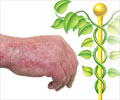A substantial part of people, one in five, undergoing systemic treatment for psoriasis still have considerable problems with their disease.

‘Almost one in five patients with psoriasis had highly active disease activity, despite ongoing systemic treatment.’





"Our results suggest that the currently available treatments are not
sufficiently treating patients with moderate-to-severe psoriasis. So in
order to manage their disease, more patients need access to currently
available biologic agents as well as other new and more efficacious
treatments," says Marcus Schmitt-Egenolf, researcher at the Department
of Public Health and Clinical Medicine at Umeå University and
corresponding author of the study.More than a decade ago, developments in biologics transformed the treatment of moderate-to-severe psoriasis by providing new ways for better skin clearance rates, low toxicity, and improved quality-of-life for patients. Nonetheless, the study led by Marcus Schmitt-Egenolf shows that despite having an ongoing systemic treatment, 18% of patients still had extensive psoriasis lesions and/or suffered impairment of their skin-related quality-of-life.
The study was based on PsoReg, which is the Swedish quality register for systemic treatment of psoriasis. 2,646 psoriasis patients who had been receiving systemic treatment for at least three months were included in the study, which analyzed their most recent visit registered in PsoReg. Disease severity was measured either by the physician's clinical assessment and/or by the patient's own assessment of their skin-related quality of life.
Compared to the larger patient group, the subgroup of patients with suboptimal therapy-response were younger and had higher BMI. They were also more often suffering from psoriasis arthritis and were more often smokers. The subgroup with higher persisting psoriasis severity also reported worse overall quality-of-life, measured with the standard evaluation method EQ-5D questionnaire.
"That almost one in five patients had highly active disease activity, despite ongoing systemic treatment, is concerning," says Marcus Schmitt-Egenolf.
Advertisement
Source-Eurekalert












